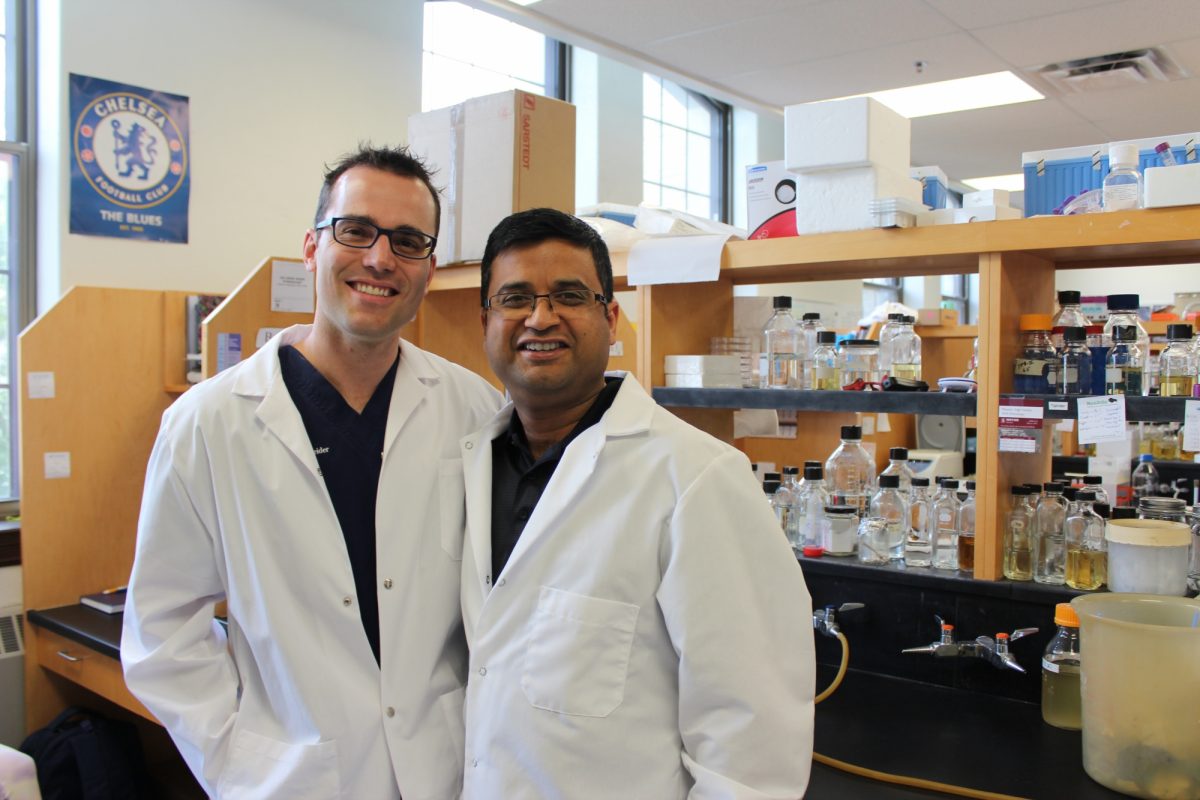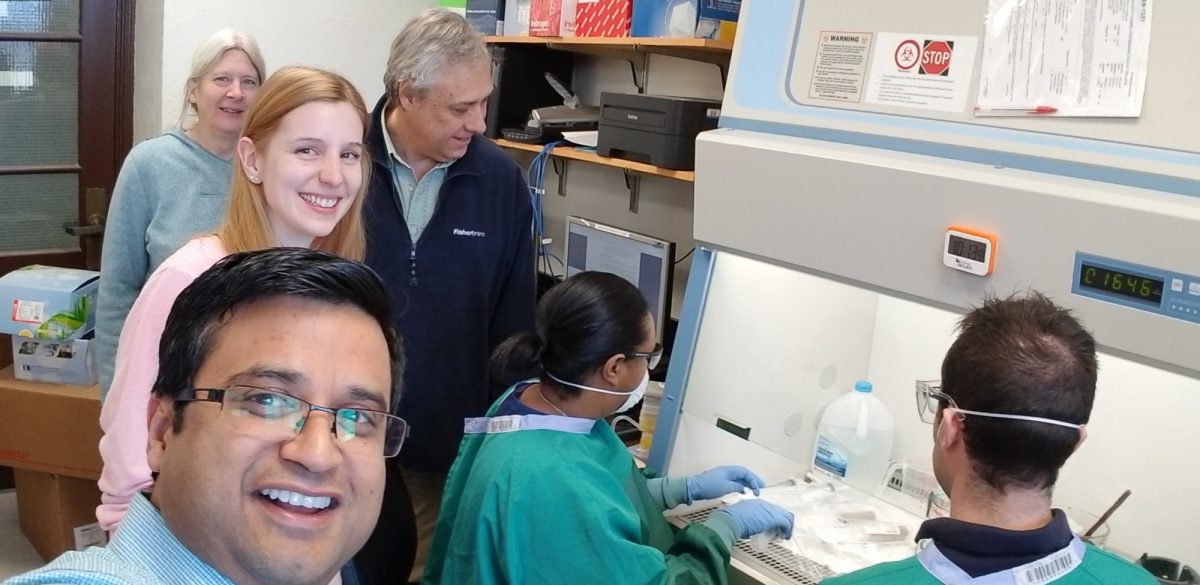
Dr. Christopher Schneider and Dr. Ayush Kumar.
Introducing Manitoba’s first Fecal Microbiota Transplant Program
Faculty of Science professor helps ensure fecal bacteria from a healthy individual can be safely transplanted into a sick patient
Not all poop is the same, at least when it comes to fecal transplants. Typically a topic avoided in polite conversation, Fecal Microbiota Transplant (FMT) is the transfer of one individual’s stool to another.
The procedure can be life-saving for Canadians who have battled, or are battling, a Clostridium difficile (C. diff) infection. Patients with C. diff infections suffer from a variety of gastrointestinal difficulties including diarrhea and cramping. In extreme cases, surgery may be necessary. Around 2,500 cases of C. diff are reported in Canada each year; approximately 16 prove fatal. However, a new program in Winnipeg may offer affected Manitobans hope.
The idea behind FMT is simple: restore the healthy balance of gut bacteria living in the intestine. If you can find a donor who has a healthy balance, you can restore the disrupted balance in an afflicted recipient.
This past year, Faculty of Science professor Ayush Kumar and Manitoba Clinic gastroenterologist Dr. Christopher Schneider teamed up to demonstrate how clinical and basic science can work together to ease patient suffering long-term and potentially eliminate the life-threatening effects of drug-resistant C. diff.
“What some don’t realize is as bacteria rapidly gain resistance to our existing arsenal of antibiotics, infections caused by antibiotic-resistant bacteria are becoming increasingly difficult to treat,” explains Kumar. “While finding new and effective antibiotics is a critical part of dealing with antibiotic resistance, equally important is the use of non-conventional treatment options such as fecal transplants.”
Inspired by FMT movements across Canada, Schneider had been working tirelessly to introduce a program in Manitoba. The main obstacle he faced was finding a lab to process the donor stool. After two years of red tape, rejection and dead ends, introducing a FMT program in Manitoba didn’t look promising.
“It was a frustrating two years,” recalls Schneider, “I worked in Montreal previously where they have a successful FMT program. I saw how this procedure was changing the lives of the individuals suffering with C. diff infections and wanted to offer Manitobans a viable option.”
That all changed in 2019.
Schneider and Kumar met by chance at their kids’ daycare in 2017. Schneider was explaining his work and difficulty to Kumar, who, with no reservations, immediately offered his lab and expertise.
A champion in his field, Kumar is the Vice-President of the Canadian Society of Microbiologists (CSM) and Professor in the Department of Microbiology at the U of M.
The unlikely duo set to work, hurdling through obstacles and approvals within two months.
“It was amazing,” notes Schneider, “Dr. Kumar didn’t have to help me but he did, without his support and the use of his lab we wouldn’t talking about this program today.”
“After speaking with Dr. Schneider, I thought why not take this opportunity to collaborate,” says Kumar. “I have the resources and equipment he needed to get this program off the ground. I’m thrilled to be part of this program and helping Manitobans in need of this treatment.”

Ayush Kumar, Gabriel Faucher and Chris Schneider preparing the donor stool for transplant
Kumar and Schneider’s teams successfully performed Manitoba’s first FMT transplant earlier this year.
With a 95 per cent success rate for C. diff infections, FMT is not only improving the quality of life for patients, but also saving an already strained health-care system hundreds of thousands of dollars.
“This procedure is extremely economical when you consider one year of oral antibiotics for a single C. diff. patient costs approximately $150,000,” notes Schneider. “That’s $150,000 funded by the tax payer through the Manitoba Pharmacare Program.” The cost to perform his procedure via colonoscopy is $275.
Schneider and Kumar are working to grow a sustainable FMT program in Manitoba. Their long-term goal is to create a frozen stool bank, with pre-screened processed stools that will allow them to offer FMT to the wider Manitoba public as needed.
Dr. Schneider and Dr. Kumar would both like to give credit to their colleagues for contributing to Manitoba’s Fecal Microbiota Transplant (FMT) program.
- Gabriel Faucher, Biomedical Engineer
- Erica Silva, Medical Assistant
- Graduate students and post-doctoral fellows from the Kumar laboratory







Will this be able to treat crohn’’s disease?
Another Manitoba discovery targeting C Diff Infection is about to start recruiting patients for a phase 2 clinical trial sometime this summer. Patient recruiting has already been approved for the Calgary arm of the study. This is a novel, non antibiotic oral dose treatment for qualifying patients with mild to moderate symptoms and first or second infection occurrence.
How can someone get on the clinical trial? Where can we get more information about the procedure, who can we talk to.
Hi there,
How can one get information about being part of the program. I had c diff a year and a half ago and have had chronic loose stool since treatment. I haven’t had anyone take this seriously and if love to be able to have normal bowel habits. I’m a cancer survivor and that is why I was in the hospital and subsequently contracted c diff. My life is not the same, thankfully I am alive but the quality is very low physically. I have two young children that need a healthy mom. I’d love any information you have 🙂
How does a person become eligible for this study?
Are they performing fecal transplant studies for epilepsy in Canada yet? I’ve read of some success internationally, and would love to volunteer for a study in Canada.